Melbourne 2015 ready for return on its tennis investment
- Published
What impact does the Australian Open have on Melbourne's economy?
The temperature is 40C in Melbourne, Roger Federer and Rafael Nadal are sporting matching headbands, and every hotel in the city is booked.
It can only mean one thing: the Australian Open tennis tournament is finally here and under way.
The Open is arguably the biggest annual sporting event in the southern hemisphere.
Hundreds of thousands are in Melbourne to watch the matches during these next two weeks, while hundreds of millions more will watch the action on TV... and that means big business.
As the first of the four annual international tennis Grand Slam tournaments, the event attracts fans from across the globe, with nearly 700,000 tickets sold.
Long-term future
Melbourne's contract to host the Australian Open was due to expire in 2016, but a pledge of a three-stage upgrade package to its sporting precinct - with a price tag of close to A$1bn ($822m; £540m) - has secured the event for the city until 2036.
The first stage of renovations has just been competed, including 1,500 additional stadium seats and a fully retractable roof for the Margaret Court Arena.
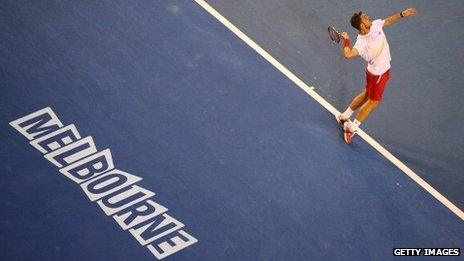
The Australian Open will be held in Melbourne for two more decades at least
Three of the principal courts now have such roofs.
These additions should avoid the stoppage of play due to extreme weather, which was an issue last year when players were complaining of heat exhaustion.
It was so hot, shoes were melting and sticking to the courts.
Stage two will involve upgrades to Rod Laver Arena and a pedestrian path connecting Melbourne Park to the train station.
'Icing on the cake'
Craig Tiley, chief executive of Tennis Australia, says the return on this hefty infrastructure investment will more than pay for itself.
"It's estimated that the Australian Open earns the State of Victoria over 200 million [Australian dollars] annually," says Mr Tiley.

The hospitality industry in Melbourne should be boosted by the visitor influx
"If you take that over the next 30 years with the investment of over 900 million [Australian dollars] that's going to be made, it's going to more than return on that investment within a few years and the rest will really just be icing on the cake."
But Larry Dwyer, professor of economics and tourism at the University of New South Wales says it is a more complicated picture.
He warns that the economic benefits of large-scale events are often oversold, and says it is important to look at all the possible costs involved.
"There will be social costs. There will be environmental costs. Traffic congestion, closed streets because of an event, discomfort for residents. It might be noise; there's lots of community costs incurred from events," says Prof Dwyer.
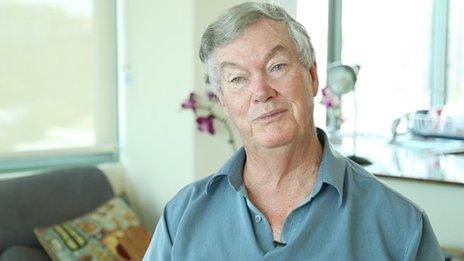
Professor Larry Dwyer says there can be a downside to top sports events
He says there can be an environmental cost, too, when a large number of spectators are gathered in one area, as is the case for the tennis, including issues such as a larger carbon footprint associated with event travel and transport.
But for the city's hospitality industry, the financial benefits surrounding the event are very clear.
About 40% of the fans that attend the tennis are from overseas or other Australian states, and together they account for nearly half a million hotel nights across Victoria state.
Next-generation tennis
And the business gains go far beyond accommodation.
Melbourne likes to think of itself as the sporting capital of the nation, and enthusiasm for tennis reaches a fever pitch in January.

The Australian Open tennis is having an influential effect on youngsters taking up the sport
Proximity to the players and wide media coverage of the matches excites die-hard tennis fans and piques the interest of new ones.
Michael Baroch runs the Melbourne International Tennis School (MITS), with campuses in both Melbourne and Singapore.
He says being near the tournament is great for business.
"We can send our kids to actually go and watch the best players in the world and look at their favourite players - and how they play tactically, technically, and even mentally," he says.
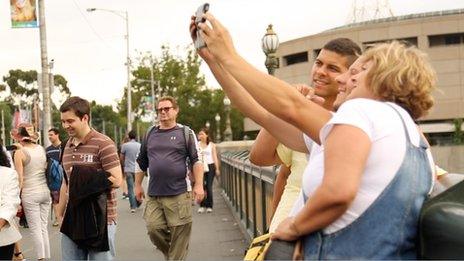
The Australian Open is the crown jewel in Melbourne's calendar of sports events
"So it's really advantageous to us in particular for the Australian Open to be here in Melbourne."
Marc Sophoulis, one of the coaches at MITS, who is working with a number of players competing in the Grand Slam this year, says the prestige of the event is alluring to other students.
"It does create a bit of buzz having three or four players from the Australian Open training among our players," he says. "We see players increasing their work loads on court and approaching us for more hours of lessons."
'Universal language'
Meanwhile, other companies are getting creative in their pursuits of the tennis dollar.
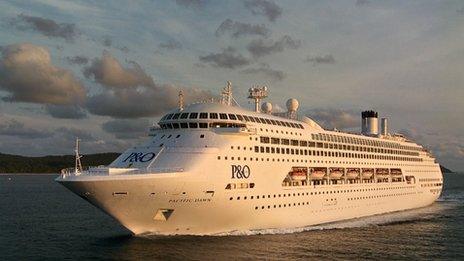
It is possible to cruise to the Melbourne event from Sydney
Australia's P&O Cruises have launched a customised Australian Open Cruise from Sydney to Melbourne for the tennis, which includes admission to the matches.
Tammy Marshall, senior vice president of the company, says that some 1,800 cruise passengers booked with them six months in advance.
And she says the venture brings in a lot of spending power to Melbourne, and a boost of A$1m to the Victorian economy.
"What we do understand from a recent economic study is that our guests are spending about A$146 per person per day in Melbourne when they are cruising," she adds.
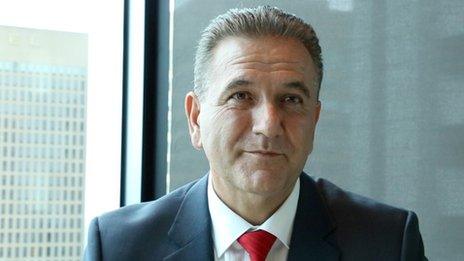
John Eren, state minister for sport, recognises the impact of the event
The Australian Open is the crown jewel in Melbourne's impressive calendar of sports events, which John Eren, state minister for sport and tourism, says are crucial for the Victorian government.
"Right across the globe it's a universal language," he says. "Everybody loves their sport, and for us, sporting events are worth about 1.8 billion to the economy here in Victoria."
With another 30 years of hosting the event on the horizon, Melbourne has secured its position as a global tennis destination at least for the foreseeable future.